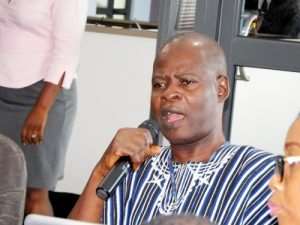
The litigation over the Ghana-Ivory Coast maritime boundary was between two sovereign states and not between a state (Ivory Coast) and a company (Ghana National Petroleum Commission) for which reason the GNPC had to fund the litigation expenditure with the budget allocated to it for exploration purposes.
This is the position of the Public Interest and Accountability Committee PIAC in its 2017 annual reports.
The GNPC spent a total of 3.8m dollars on the secretariat activities on litigation from its resources, instead of the monies released from the state.
PIAC in its 2017 Annual Report is demanding that “the amount of US$3.8 million spent by GNPC on the litigation should be refunded to GNPC by the government.”
If the $3.8m is not paid by the state, it will add to a similar loan of $50m the then government of John Mahama took from the GNPC in 2014 that are yet to be paid.
To see an end to these borrowing from GNPC's budget, PIAC believes that “Parliament must intensify its role of ensuring that budgeted expenditure of GNPC complies with the Corporation's core mandate.”
Ghana's oil discovery
In 2007, Ghana discovered oil and gas in commercial quantities, and this was followed by Cote d'Ivoire staking its claim to portions of the West Cape Three Points.
They revived the claims in 2010 after Vanco, an oil exploration and production company announced the discovery of oil in the Dzata-1 deepwater-well.
Cote d'Ivoire petitioned the United Nations asking for completion of the demarcation of its maritime boundary with Ghana, and Ghana responded by setting up of the Ghana Boundary Commission.
This commission was responsible for negotiating with Côte d'Ivoire towards finding a lasting solution to the problem.
But this commission bore no fruit, and in September 2014, Ghana dragged Cote d'Ivoire to ITLOS after ten failed negotiations.
ITLOS's first ruling in 2015 placed a moratorium on new projects, with old projects continuing after Cote d'Ivoire filed for preliminary measures and urged the tribunal to suspend all activities on the disputed area until the definitive determination of the case.
The moratorium prevented Tullow Oil from drilling additional 13 wells. Tullow thus drilled eleven [11] wells in Ghana's first oil field.
ITLOS ruling in 2017
But in 2017, the long-standing maritime dispute between Ghana and Cote D'lvoire came to what appears to be a closure on Saturday, September 23, 2017, after ITLOS ruled largely i n favor of Ghana .

Print
The Chamber ruled that there has not been any violation on the part of Ghana on Côte d'Ivoire's maritime boundary.
It further rejected Côte D'Ivoire's argument that Ghana's coastal lines were unstable, adding that Ghana had not violated Côte d'Ivoire's sovereign rights with its oil exploration in the disputed basin in question.




 Akufo-Addo commissions Phase II of Kaleo solar power plant
Akufo-Addo commissions Phase II of Kaleo solar power plant
 NDC panics over Bawumia’s visit to Pope Francis
NDC panics over Bawumia’s visit to Pope Francis
 EC blasts Mahama over “false” claims on recruitment of Returning Officers
EC blasts Mahama over “false” claims on recruitment of Returning Officers
 Lands Minister gives ultimatum to Future Global Resources to revamp Prestea/Bogo...
Lands Minister gives ultimatum to Future Global Resources to revamp Prestea/Bogo...
 Wa Naa appeals to Akufo-Addo to audit state lands in Wa
Wa Naa appeals to Akufo-Addo to audit state lands in Wa
 Prof Opoku-Agyemang misunderstood Bawumia’s ‘driver mate’ analogy – Miracles Abo...
Prof Opoku-Agyemang misunderstood Bawumia’s ‘driver mate’ analogy – Miracles Abo...
 EU confident Ghana will not sign Anti-LGBTQI Bill
EU confident Ghana will not sign Anti-LGBTQI Bill
 Suspend implementation of Planting for Food and Jobs for 2024 - Stakeholders
Suspend implementation of Planting for Food and Jobs for 2024 - Stakeholders
 Tema West Municipal Assembly gets Ghana's First Female Aircraft Marshaller as ne...
Tema West Municipal Assembly gets Ghana's First Female Aircraft Marshaller as ne...
 Dumsor is affecting us double, release timetable – Disability Federation to ECG
Dumsor is affecting us double, release timetable – Disability Federation to ECG
